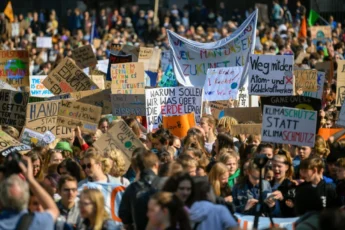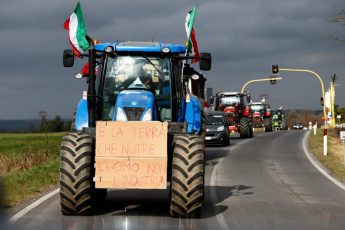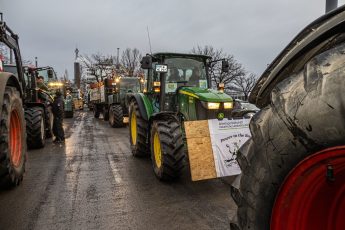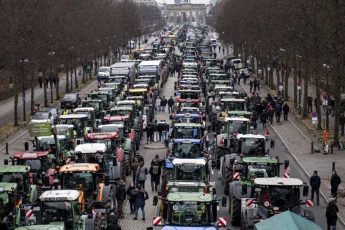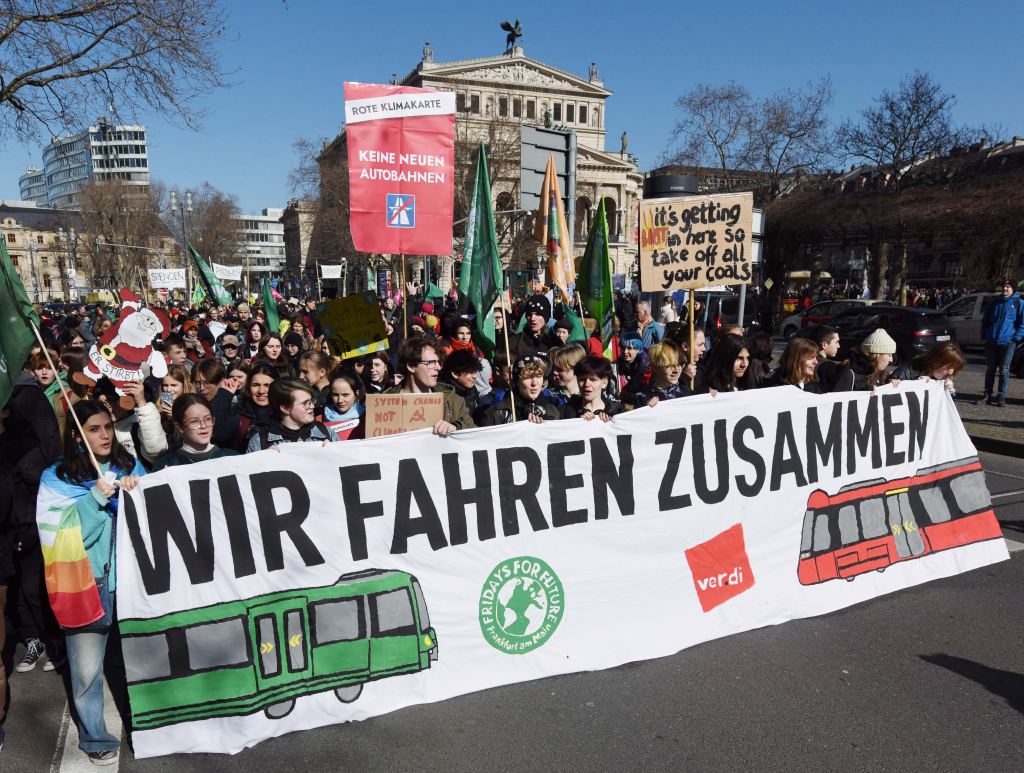
by CLIMATE CLASS CONFLICT
We interviewed Friedrich Graeber, activist of Fridays For Future Magdeburg. Friedrich told us about the convergence between workers in the public transport sector and climate activists, which this year produced in Germany a joint strike. The idea that the struggles for climate and social justice “really belong together” has shaped the common demand for radical change which fueled the strike’s movement. We are facing more and more economic and ecological crises, which are global not only in their geographical extension, but also because they affect the whole system of social reproduction. While the war has reshaped the “green transition” and worsened the working conditions, inflation and economic crisis are also impoverishing workers’ lives. In Germany, workers and climate activists are asking for more money from the federal state to be invested in public transportation, in order to have at the same time better wages and cheaper and greener means of transportation. As Friedrich underlines, more international involvement is still needed, but although we face similar crises in different places, we also have to take into account different conditions. How to connect different struggles and how can we find common claims for different circumstances? Although we don’t have any ready-made solution, the strike still happens to be our strongest weapon which, as Friedrich says, has been able to produce a long-lasting connection between workers and climate justice movements.
Climate Class Conflict: March 3 has been a global day of climate strike. Thousands of people all over the world have taken to the streets. The climate strike has become a process to oppose the green capitalist transition and demand climate and social justice. In Germany, this process has taken a peculiar shape this year, thanks to the open connection between climate strike and public transport workers’ strike. Can you tell us how this encounter happened? Is the process still ongoing?
Friedrich Graeber: we, from Fridays for Future, striked together with workers in the public transportation in several places. We also went to the streets, demonstrated together and joined the picket lines. All this goes back to three years ago when we approached the trade unions in Germany and we asked them if they were interested in working together, because, as you said, we have to connect climate and social justice fights. We got an answer from public transport workers, which were interested in working together with us, and since then we started to build an alliance in more and more cities in Germany. Last year we had a meeting together again in Berlin where people from all over the country came together and decided to support public workers in their next big strike waves. The first one was now in March, it was for the public service, and next year our plan is to strike again together, at the start of the year, when there will be negotiations for working conditions for all public transport workers in all Germany. So, we will strike together all over Germany and shut down public transport in order to get better working conditions and higher wages for the workers and also more money for transition, for more capacity.
CCC: Which are your common claims?
FG: Our claim is more public money spent for the public transport sector, as this money is needed for higher wages, better working conditions, because they are facing right now labour shortages, so they are desperately needing new workers but, if they don’t increase the wages, they can’t find more workers. We also want a transition of transport in Germany, a transition away from individual car-based mobility towards a more public transport sector affordable for all people. Our demand is to double the capacity of public transportation by 2030.
CCC: Few months ago a huge struggle in Lutzerath was held by activists joining the German movement from all over Europe to prevent government from furthering its plans for coal extractions. That case has shown how the war in Ukraine is used to support investments in polluting resources, as well as for worsening working conditions. Wages have been eroded by inflation and rising costs of living, while in many ‘strategic’ sectors workers have been prevented from striking as it would have affected the national security. How do you think the war in Ukraine is influencing plans for green transition, and so also affecting workers and climate struggles?
FG: As you said very well, we face several crisis of the economic system, not only the inflation but also the energy shortage. We still feel the consequences of the pandemic. All this affects very clearly our labour struggles. A lot of people are desperate for more money because they cannot afford to live on their wages, they can’t afford to live with their wage from public transportation for example, and if they don’t earn enough they need to search for another job. That’s the opposite of what we want, we want more workers in public transport, and that’s why we work together. The two struggles for climate and social justice really belong together, not only since the war started, but even before, we fight the same root of the problem which is the capitalistic system we live in. So it totally makes sense to unite the fights, we fight for the same goals.
CCC. France is now hit by a huge wave of strikes and demonstrations. The anger is fueled not only by the reform of the pension system, but by a more general crisis of social reproduction, which is also an ecological crisis. This was clearly stated following the activists in Sainte-Soline, which have claimed that social and climate struggles are the same struggle. Do you see the possibility for a transnational connection of the political struggle in Germany you described, with those that are going on in other places?
FG: I think this is possible and that is what we aim at, it is the global economic system that is causing the current crisis, which is also a global ecological crisis, so our answer must also be global. We have to try to unite our struggles also internationally, this is exactly what we try right now. We are speaking to you, but we also spoke with other international media and with activists of our movement in other countries. We set up meetings with other activists not only in Europe but also beyond, to share our experiences and to exchange ideas and plans. We have similar situations in different countries, we see the cost of living crisis and we see the immediate impact on the ecological side. So, we always have these two kinds of classes which are there, and which have the same problem which unites their fights, It makes sense also because with the increasing ecological destruction and the increasing impact of the climate crisis we will face more and more social inequalities as well.
CCC: Going back to what has happened in Germany. We’ve seen different tactics in the climate movement, how did you come up with the strike? According to you, is the strike gaining new importance and power? What is the situation right now?
FG: We always talk about “diversity of tactics” in the climate movement, but I’ve always had the feeling that there was something missing, which is the economic strike, because the strike has the most economic impact on the capitalist class and it costs the hugest economic damages as well. So, there was one tactic missing in this repertoire, and I don’t want to say that other tactics are less important or less valuable, but the strike is one huge possibility to increase the pressure. That’s the reason why we came up with the strike and we thought we should try it out at least. Also, the workers in the factories, at least in Germany, they never really perceived themselves as part of the climate justice movement, which is really strange in a sense because they are one of the groups that are the most affected. The example of mobility transitioning will have huge effects on the mobility industry, for example on German car industry, and a lot of workers will lose their jobs if we don’t intervene and say that we want to keep these jobs, but we want them to be green and sustainable jobs. This is also the reason why we try to connect these fights and try to include the workers’ strike into the climate justice movement.
Just few days ago, the biggest union called Ver.di, where there are a lot of transport workers, had an agreement with the employers. They agreed on the hugest gain of wages in public sector since at least WWII, and they achieved a raise of wages in other industries, such as the metal one. But the agreement means that strikes in the public sector are over for now. They will ask now workers to vote. If 25% of the workers agree, then the deal is done and strikes are over. However there a lot of controversies among workers now, because the rise of wages is not as high as workers demanded. There are mixed feelings, and some want to continue to strike and go for a longer and more severe strike. As climate justice movement we are waiting to see what workers decide and we are aware that workers won an historical fight. We saw in the streets that the fights were more severe than last years, there was more determination and this paid out in results. Others in the public sector are still negotiating, such as railroad workers of Deutsche Bahn, so there might be more strikes coming up, but the huge strikes are over for now. They will come again soon, since for us the most important one is the campaign starting next year, when all workers from public transportation will fight and negotiate for better working conditions.


